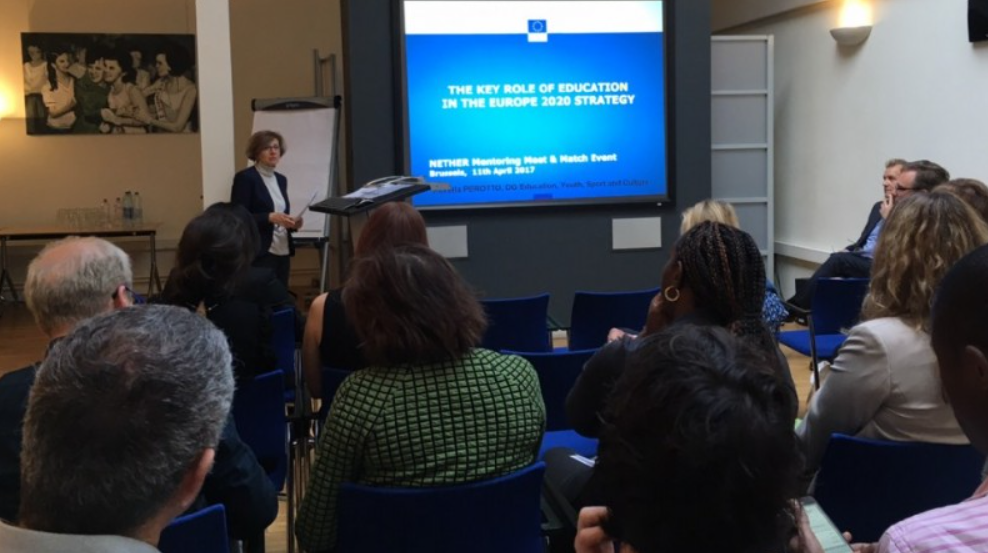Meet and Match Brussels summary of the event
European Center for Evidence-Based Mentoring organized in collaboration with national and regional mentoring partners a Mentoring Meet & Match in Brussels, on 11 / 12 April 2017. It was the first time that such an event took place for mentoring organizations and decision makers from all over Europe, in order to advocate for the multi-sectoral effects of mentoring and seek the multi-sectoral support on a European level.
Goal of this event was twofold: on the one hand to connect to representatives of EU decision and policy making and talk about the current focus in terms of European challenges and Europe2020 strategy. On the other hand, the event united organizations from different regions, sectors and backgrounds in order to plead for a place of mentoring on EU agendas.
Programme of the day
At the opening of the day, keynote speaker ms Fiorella Perotto (Deputy Head of Unit at the European Commission, Directorate-General Education, Youth, Sport and Culture, Unit Strategy and Investments) presented the headline targets of the European Commission. Jobs, growth and investment are number 1 priority for a deeper and fairer economic union. Education is considered a powerful driver for social inclusion and to combat poverty. A challenge in the EU is to keep early school leaving bellow 10 procent. Another priority is tertiary education: 40 procent being the target in order to reach more academic excellence and innovation. There are also country specific recommendations. The framework for European cooperation in education and training is called ET2020. There is intensive peer learning among the member states in order to exchange best practices. This peer learning allows member states to set common goals – a feature that Mrs Fiorelli is especially proud of. The New Skills Agenda of EU promotes the intercultural dialogue and the integration of migrants, amongst others.
After the keynote, discussions took place in the form of a World Café. Topic of the Café was “Mentoring touches eternity, you never know where the impact ends…” – Bijvoets
The presentations of best practices gave participants an insight in how to develop a national eco system for mentoring. They highlighted the importance of public / private collaboration in order to connect organizations, people, and ultimately create mentoring relationships.
Ms Julia Schermann, programme leader of the national “Aktion Zusammen Wachsen” mentoring campaign of the Federal Ministry for Family Affairs, Senior Citizens, Women and Youth, gave a presentation about this campaign, strengthening educational mentoring and promoting integration.Mr Florian Stenzel, Netzwerk Berliner Kinderpatenschaften, spoke about how mentoring adresses some of the European key-objectives and challenges, and gave perspective of a regional network.
The head of the Diana Award Mentoring Campaign and delivery partner of the Government Mentoring Fund (UK), Ms Emma Scott, talked about how the Diana Award Mentoring Programme connects with the Europe 2020 strategy and an approach to evidence and evaluation.
Thereafter, a presentation about public–civil society partnerships in mentoring programmes, was given by Mr Orland Cardona, head of unit Interdepartmental policy & Civil Society of the Government of Catalonia; initiator and head of the Mentoring Programme for Refugees in Catalonia, ES.
During the panel discussion, Mrs Cunningham (policy officer at DG EAC, unit schools and educators) pointed out that it is the right time to place mentoring in the spotlights. She congratulated the programmes at present, with their efforts in linking people, cultures, social groups and organizations. According to her, mentoring incapsulates the way we need to go.
Mrs Illies (policy officer at DG EMPL, unit inclusion) recommended to engage in EU events and to give European bodies input for policy decisions. Mentoring programmes and their stakeholders can deliver important information, experience and example.
Thematic sessions in subgroups:
– Mentoring and reseach: the evidence, by MentorProgramma Friesland
– The business model of the European Center for Evidence-Based Mentoring, by student Maaike Kroes
– Mentoring in a vital region: best practices, by Big Brothers Big Sisters Russia, Mentors of Rotterdam and Passeport Avenir
Location of the Meet & Match was Neth-ER office, 22, Rue d’Arlon, Brussels.
Chairman of the day was Dr. Marc Coenders, professor of Agile Crafsmanship of NHL University of Applied Sciences and European Center for Evidence-Based Mentoring.
